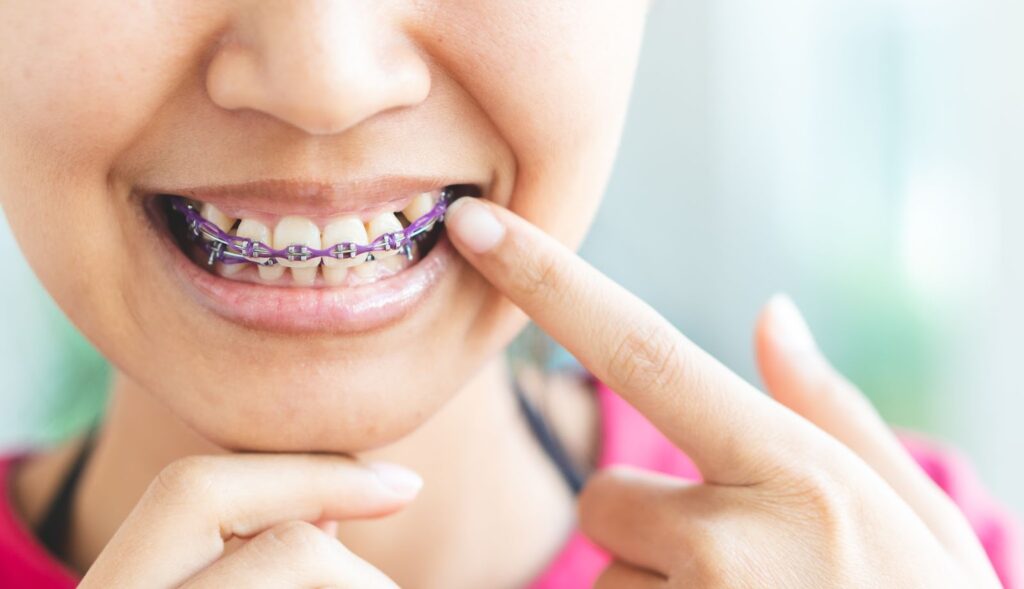Getting braces is an exciting step towards achieving a beautiful smile. But the first week can be challenging as you adjust to the new sensation in your mouth. Food choices in your first week with braces could include:
- Soft fruits and vegetables
- Various dairy products
- Soft and easy-to-chew proteins
Proper nutrition is crucial during this period to ensure comfort and help prevent any complications. Following some of these suggestions on what to eat as you adjust to your braces can help you maintain a healthy, balanced diet. Nutrition isn’t the only concern following new braces, though. Our dental team at Genesis Dental in Surrey can also help support your dental hygiene while going through braces treatment with your orthodontist.
What to Expect During the First Week
You might experience some discomfort and pressure as your teeth begin to shift when you first get braces. It’s normal to feel soreness in your mouth and tenderness in your cheeks and gums. This adjustment period can be frustrating, but it’s temporary. Your body needs time to get used to the braces; before long, you’ll probably barely notice them.
You might also encounter some challenges while eating. Biting into hard or sticky foods can be uncomfortable and can damage your braces. It’s essential to be mindful of your food choices to avoid unnecessary pain or complications.
Do’s & Don’ts for Eating with Braces
Your orthodontist will provide instructions specific to your situation, but here are some guidelines for foods to enjoy and foods to avoid.
Safe Foods to Enjoy
Soft foods are your best friends when it comes to eating with braces. They are gentle on your teeth and brackets, making them easier to chew and swallow. Some great options include:
- Soft fruits and vegetables: Bananas, avocados, steamed carrots, and mashed potatoes are all tooth-friendly choices that provide essential nutrients.
- Dairy products: Yogurt, cheese, and pudding are excellent sources of calcium and protein, which support healthy teeth and bones.
- Proteins: Soft-cooked eggs, tofu, and tender fish are easy to eat and packed with nutrients to keep you strong and healthy.
Foods to Avoid
Certain foods can pose a risk to your braces, causing damage or increasing discomfort. It’s wise to steer clear of:
- Hard and crunchy foods: Nuts, popcorn, and raw carrots can break brackets and wires, leading to additional trips to the orthodontist.
- Sticky and chewy foods: Gum, caramel, and chewy candies can get stuck in your braces and are challenging to clean, increasing the risk of cavities.
- Sugary foods and drinks: Sodas, candy, and sugary snacks can lead to plaque buildup and tooth decay, so it’s best to limit their consumption.

Easy-to-Eat Food Ideas
Some foods are particularly beneficial for those with braces, as they are both nutritious and easy to eat:
Smoothies: Blend fruits, vegetables, yogurt, and a protein source for a delicious and nutrient-packed meal.
Soups: Soups made with soft vegetables, lean proteins, and whole grains can be comforting and easy to consume.
Scrambled eggs: Soft and easy to chew, scrambled eggs are a great source of protein and other essential nutrients.
Tips for Eating Comfortably
To make eating with braces more enjoyable, try cutting your food into smaller pieces and chewing slowly. This helps minimize pressure on your teeth and reduces the risk of damaging your braces. Try softer cooking methods, such as steaming or boiling, to make your meals more manageable.
The Importance of Oral Hygiene
Proper oral hygiene is essential when you have braces, as food particles and plaque can easily get trapped in the brackets and wires. Neglecting your oral care routine can lead to cavities, gum disease, and other complications. Here are some tips to keep your teeth and braces clean and healthy:
- Brush after every meal: Use a soft-bristle toothbrush and fluoride toothpaste to clean your teeth and braces gently. Angle the brush to reach all surfaces, including between the brackets and along the gumline.
- Floss daily: Flossing with braces can be challenging, but it’s crucial for removing food particles and plaque between your teeth. Consider using a floss threader or orthodontic floss to make the process easier.
- Rinse with mouthwash: An antimicrobial mouthwash can help reduce plaque and bacteria, promoting good oral health.
Recommended Tools & Products
Investing in the right tools can make a significant difference in maintaining your oral hygiene with braces.
- Interdental brushes: These small brushes can reach areas that a regular toothbrush can’t, making cleaning around your brackets and wires easier.
- Water flossers: A water flosser uses a stream of water to remove food particles and plaque from between your teeth and along the gum line, making flossing more efficient and comfortable.
- Orthodontic wax: If your braces cause irritation or sores in your mouth, applying orthodontic wax to the brackets can relieve discomfort and protect your cheeks and gums.
The Journey to a Straighter Smile
Your first week with braces may be challenging, but with the right approach to eating and oral care, you can ensure a smooth and comfortable transition. Remember to choose soft, nutrient-rich foods, avoid hard and sticky items, and maintain a diligent oral hygiene routine. By following these tips, you’ll be well on your way to a healthy, beautiful smile.Contact our professional team at Genesis Dental if you have any concerns or need personalized advice. We’re happy to answer your questions or book you an appointment with one of our experienced dentists and hygienists.




